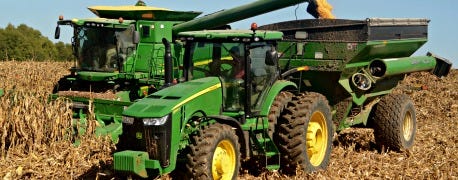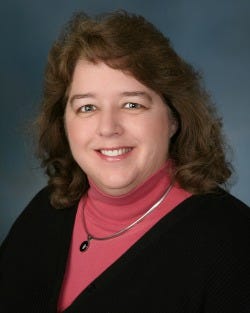
Are you looking to lease farm equipment in 2015? The University of Missouri Extension North Central Region recently published a new free lease form that will help iron out terms of farm machinery lease.
The new lease form entitled Farm Machinery Lease for Non-commercial Transactions helps farmers with writing a lease agreement.
The terms rental and lease are often used interchangeably, but when referring to farm equipment there is a difference in the control period, explains MU Extension ag business specialist Mary Sobba. "Leases typically permit the farmer to control the equipment for one or more years, while rental agreements typically last for less than one year."

IN AGREEMENT: MU Extension is offering a new lease form for farm machinery.
Sobba explains the differences between renting and leasing equipment in a recent issue of the MU Extension newsletter AgConnection.
Rent vs. lease
A typical rental agreement includes a specified rate for every hour registered on the hour meter of the machine, she says. "Frequently, payment for a minimum number of hours is also required. The beginning and ending dates of the rental period restrict the total use of the machine." Rental agreements are especially useful for machines used only for a short period such as skid loaders, grain drills, combines and large tractors.
Sobba says that for long-term control of equipment, leasing is a choice. "Leasing plans offer a large degree of flexibility for payment terms," she explains. Farm machinery dealers, manufacturers, finance companies all offer lease opportunities. However, both company financing and leasing terms change over time, so it is important that farmers evaluate each decision.
Two types of leases

Mary Sobba
There are two general types of leases: 1) true or operating leases and 2) finance or capital lease. "They are treated differently for income tax purposes," Sobba notes.
A true or operating lease includes a series of regular payments, usually annual or semiannual, for a period of years. At the end of the lease period, the operator can purchase the machine at a price close to fair market value or extend the lease.
If the farmer no longer needs or wants the machine, it can be returned to the leasing entity. "Lease payments are reported as ordinary expenses on the tax return, and are fully deductible," Sobba explains. "If the purchase option is exercised, the machine is then placed on the farm's depreciation schedule, with a beginning tax basis equal to the purchase price."
Sobba points out that a finance or capital lease has a similar payment schedule to a true lease, but is treated as a conditional sales contract by the Internal Revenue Service. "The farmer is considered to be the owner of the machine, so it is put on the farm depreciation schedule," she says. "Payments made to the lease company must be divided into interest and principal, with only the interest portion being tax deductible."
Many finance leases are similar to balloon payment loans set up for three to five years. "The difference is at the end of the lease period, the operator can choose to either return the machine to the dealer or make the final balloon purchase payment," Sobba adds. "Since the finance lease is not being taxed as a true lease, the final buy-out price can be quite variable, depending on the length of the lease and the size of the payments."
Lease language
Here are a few items Sobba advises putting in a farm lease:
1) The customer and dealer names and information
2) The exact piece of equipment being leased
3) The beginning and ending dates of the lease
4) The base hours defined as the annual number of hours the equipment is expected to be used
5) The payment due the lessor (owner of equipment) for use in excess of the base hours
For a complete list of items that should be included in farm equipment leases contact a University of Missouri Extension ag business specialist.
Sample equipment lease forms are available on http://aglease101.org or through extension ag business specialists.
Information for this article also provided by the University of Missouri Extension, Mary Sobba, MU ag business specialist.
About the Author(s)
You May Also Like






